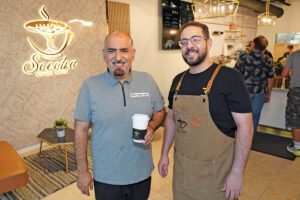From ancestral farmland in Yemen to a refreshed space in a Packard St. strip mall, Socotra Coffee House is a combined family effort to add a distinctive element to a particularly multicultural part of town.
Three years in the making, Socotra stems from Wazira Alrabeei’s decades-long cottage industry making desserts for her friends and family. It opened in late August next to Monty’s Public House.

Socotra grew out of Wazira Alrabeei’s home business making Yemeni desserts. Her bother Ebrahim (left) is co-owner and her son Imad Alghazali is the manager. | Photo: J. Adrian Wylie
“At one point, we had like four fridges at the house and everybody coming to get a cake, so we decided to open up our own business,” relates her son, Imad Alghazali, a former Ann Arbor Township firefighter who helps manage the front of the house after working his day job as a sales rep. “And then the coffee kind of came into the idea just being passed down from generation to generation.”
Alrabeei’s the owner, along with her brother, Ebrahim Alrabeei, who “refused to go into any other business other than working with my mom,” Alghazali says. He credits his uncle for the inviting decor, with brass-toned fixtures and atmospheric artwork, including a large, commissioned mural depicting key elements exemplifying Yemeni culture. “This man, I did not know he had this kind of style. He doesn’t dress like it,” he jokes. “But the way this came out, I had to ask who his interior designer was. And it was all him!”
Another manager, Imad’s cousin Sal Alghazali, is among some three dozen members of the extended family to have a hand in getting their first business off the ground and staying open more than 100 hours a week. Both cousins were born in Yemen but largely grew up in Ann Arbor. Alghazali explains that an ancestor working in the shipping industry from the port city of Aden came to New York, found work in Harlem, and stayed. Relatives back home thought he had died in a shipwreck, but he eventually saved enough money to surprise them with a return visit, leading the way for family members to emigrate to several U.S. states at various times since in the mid-twentieth century.
“We’re lucky that our grandparents were very rich in land back home,” says Sal Alghazali, an auditor by trade. “So since we’re all mostly in the United States we kind of had a lot of land with nothing growing on them yet. So when we thought of this idea of establishment three years ahead, we told them, hey, we want to open a coffee shop. So let’s start using the empty land to grow our own coffee.”
The menu features a full range of roasts and drink styles using the qahwa imported from Ibb, within the south Arabian region where the worldwide trade in coffee is thought to have originated. Rich soil, mountainous climate, and traditional processing methods combine to produce a robust brew, blended with various spices. Tea options include the popular Adeni chai, a Yemeni black tea with cardamom, nutmeg, and condensed milk.
The wide assortment of house-made pastries includes variations on such Yemeni specialties as honeycomb bread and the multilayered sabaya, as well as cheesecakes, tres leches, tarts, cakes ranging from red velvet to Oreo, and even tiramisu.
Socotra refers to an isolated island (and its archipelago) known for its variety of endemic fauna and flora, including the umbrella-shaped dragon blood tree seen in the shop’s logo and mural. Although it too has been affected by Yemen’s ongoing multilateral civil war, the naming homage transcends politics, as Sal Alghazali says: “We wanted to kind of bring light to the island and have more people understand what it is, the history of it and its beautiful nature.”
Socotra Coffee House, 3130 Packard St. (734) 929–5672. Mon.–Thurs. 7 a.m.–10 p.m., Fri. 7 a.m.–midnight, Sat. 10 a.m.–midnight, Sun. 10 a.m.–10 p.m. socotracoffeehouse.com